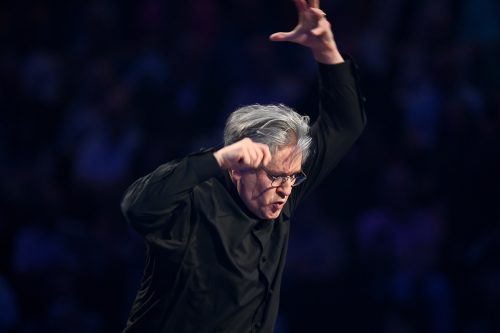
 United Kingdom PROM 37 – Britten’s War Requiem, Op.66: Natalya Romaniw (soprano0, Allan Clayton (tenor), Will Liverman (baritone), Tiffin Boys’ Choir, BBC Symphony Chorus, London Symphony Chorus, London Symphony Orchestra / Sir Antonio Pappano (conductor). Royal Albert Hall, London, 17.8.2024. (KMcD)
United Kingdom PROM 37 – Britten’s War Requiem, Op.66: Natalya Romaniw (soprano0, Allan Clayton (tenor), Will Liverman (baritone), Tiffin Boys’ Choir, BBC Symphony Chorus, London Symphony Chorus, London Symphony Orchestra / Sir Antonio Pappano (conductor). Royal Albert Hall, London, 17.8.2024. (KMcD)

‘All a poet can do today is warn. That is why the true poet must be truthful’. World War One poet Wilfred Owen’s commentary on his work resonates these days as forcefully as it did in 1918. A selection of his war poems, judiciously chosen by Benjamin Britten to act as a commentary on the liturgical Latin mass, form the emotional epicentre of his War Requiem – commissioned to celebrate the consecration of the new Coventry Cathedral in 1962. The original fourteenth-century cathedral was razed to the ground in the Second World War, so Britten’s monumental work is a cry against the horrors of war, and is arguably his finest achievement.
Operating on three distinct musical levels – full orchestra, choir and soprano soloist for the setting of the mass, a children’s choir, and a chamber orchestra that accompanies the tenor and baritone soloists who bring Owen’s poems vividly to life – it tests the mettle of its performers to the limit, and requires a conductor who can marshal such forces effectively.
In his first appearance at the BBC Proms as the London Symphony Orchestra’s new music director, Antonio Pappano conducted a performance of such emotionally-shattering intensity, few can have left the Royal Albert Hall unmoved by the experience. Each element of the work was fully in his grasp, which resulted in every performer giving their all, and it was evident in every bar that they had been expertly drilled as no one put a foot wrong.
The choral writing is technically difficult, and its dynamic range, from barely audible pianissimos to triple forte, is a challenge for even the most experienced choristers, yet the massed singers of the London Symphony and BBC Symphony Choruses seemed totally unfazed by what was asked of them. Their diction was impeccable, every syllable distinct and audible, from the hushed opening of ‘Requiem Aeternam’ to the declamatory passages of the ‘Dies irae’, their every utterance was wonderfully controlled. Credit is due to both chorus directors, Mariana Rosas and Neil Ferris for preparing the choristers so well.
For a work that relies so heavily on its spatial effects there can be no better venue than the Royal Albert Hall, and by placing the Tiffin Boys’ Choir (superbly directed by James Day) in the Gallery, their ethereal, other worldly interjections – wonderfully controlled, and compelling – enhanced the emotional pull of the piece.

That emotion was delivered in spades by Allan Clayton (tenor) and Will Liverman (baritone), who brought Owen’s harrowing poetry to life – and with achingly-beautiful poignancy. Clayton has sung this part before, but there was nothing routine about his performance. He took many risks – whether bleaching the colour from his voice in ‘One ever hangs where shelled roads part’, or honing his tone to a barely-audible whisper at the start of ‘It seemed that out of battle I escaped’ – but they all paid off. His singing was a lesson in the art of communication – quite exceptional.
Liverman took a while to get into his stride – his ‘Bugles sang’ lacked power, as if he were trying to gauge the size of the venue – but from thereon in, his singing grew immeasurably in stature, providing the perfect foil to Clayton’s vibrant tenor in ‘Out there, we’ve walked quite friendly up to Death’. ‘Be slowly lifted up, though long black arm’ had grit, and purpose, crowned with a stonking top A-flat. Together with Clayton, he made sure the final poem ‘Strange Meeting’ exuded the required pathos, his singing infused with emotion.
Natalya Romaniw was thrilling in her interjections with the main choir, producing a stream of glorious high notes, easily riding the orchestral and choral tumult, yet still capable of some gorgeously limpid tone, most notably in the ‘Lacrimosa’. Benjamin Gilmore led the ever-attentive chamber orchestra faultlessly and the full orchestra, under Carmine Lauri, played like heroes.
Britten always wanted performances of War Requiem to be an ‘occasion’, and this extraordinary performance was certainly that. Harrowing yes, yet uplifting at the same time, this was one of those Proms that will linger long in the memory. Thankfully there were cameras present, so the performance is now available on the BBC iPlayer for a limited time, and should be essential viewing for anyone who believes in the transformative power of music.
Keith McDonnell
